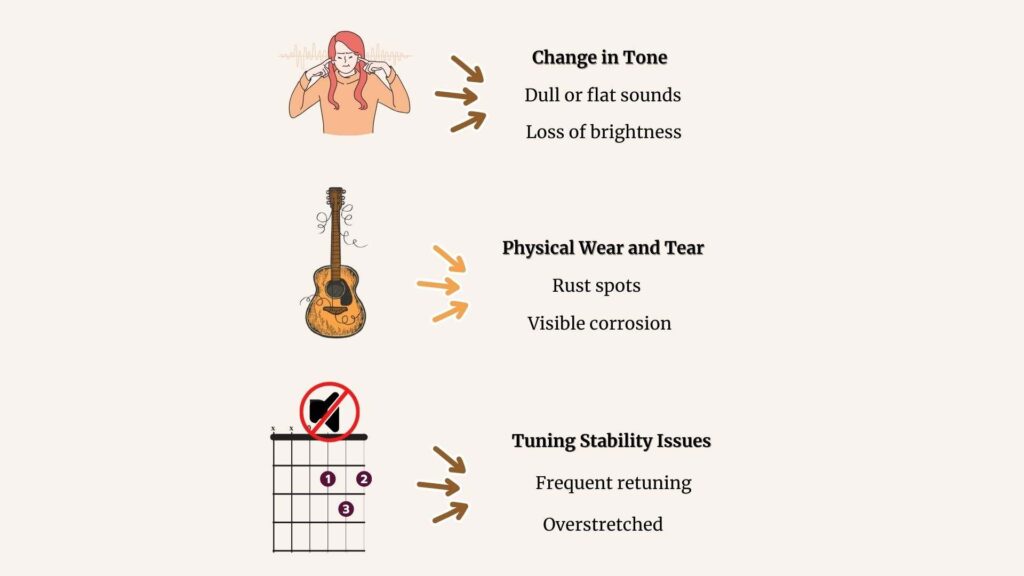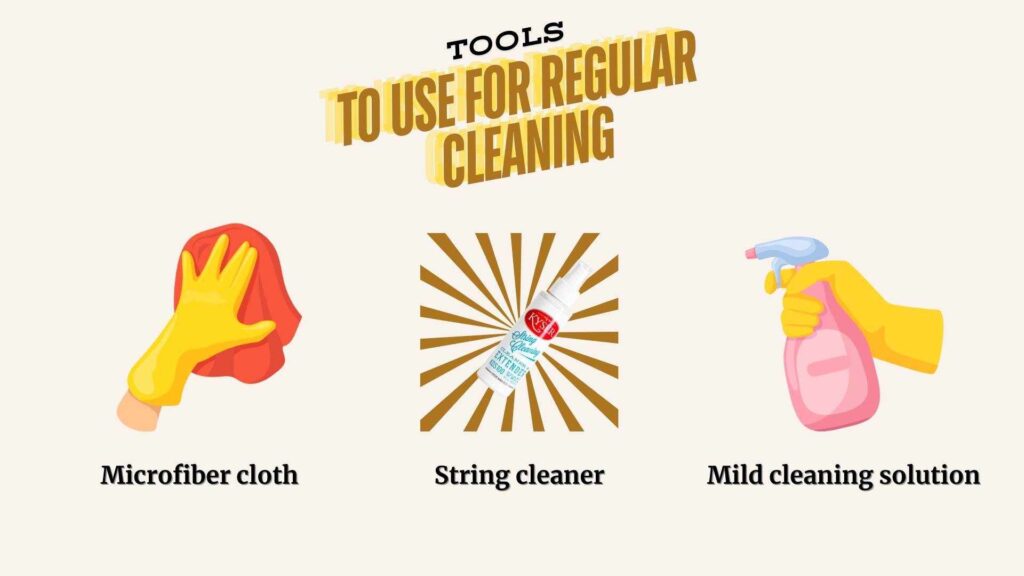How Long Do Guitar Strings Last?

As a guitarist, there is no denying that your strings are your lifeline in producing the melody. But like any other instrument’s parts, strings also have a limited lifespan. There is much wrangling on how long guitar strings last. Some say they can last 2 to 3 weeks, while others believe they can last 2 to 3 months.
However, most guitar players agree that guitar strings last from 2 to 3 months on average.
Another question arises: how will you know that your strings are running out of serviceable life?
It’s simple if you are facing:
- Buzzing and unwanted noise
- Difficulty tuning
- Reduced tone and sustain
- Frequent finger fatigue
That means it is time to replace your guitar strings. If you are frustrated by any of these issues or are thinking of changing the string, we know what you need.
We have some of the best answers on how long different guitar strings usually last and a few effective tips to help you make them last longer.
Moment of The Truth: How Long Do Guitar Strings Last
- If you play the guitar every day for 1 to 2 hours, your strings will last between 2 – 3 weeks to 2-3 months
- When playing the electric guitar, stainless steel strings last longer when exposed to sweaty palms.
- Acoustic guitar owners should choose phosphor bronze and coated strings for a longer string lifespan.
- For classical guitarists, it’s best to use nylon strings to survive humidity.
- Properly marinating and cleaning the strings can extend their lifespan.
- Zager EZ is the top choice for coated strings that protect your strings from damage.
5 Factors That Influence the Lifespan of Guitar Strings

Type of Guitar Strings
| Guitar Strings | Type | What They Do | Impact on longevity | Verdict |
| Electric Guitar Strings | Nickel-plated steel | Nickel-plated steel is the common one with a warmer and balanced tone. | For players who go fast on strings, they think nickel-plated wear down fast. | So, if you sweat too much or play in humidity, try stainless steel for your electric guitar. |
| Stainless steel | Stainless steel gives a brighter and stiffer tone. | Conversely, stainless steel is less prone to sweat and oil and doesn’t wear down quickly. | ||
| Acoustic Guitar Strings | Bronze | Traditional bronze strings offer a warm and mellow tone. | Bronze quickly oxidizes, leading to a dull tone and reduced longevity. Depending on use, it can last up to a few weeks to a month. | Compared to Phosphor bronze and coated strings, regular bronze strings lose their brightness quickly. Bronze will last a few weeks, but Phosphor bronze and coated strings often provide extended longevity. |
| Phosphor bronze | Phosphor bronze is the popular choice for its balanced tone for acoustic. | Phosphor bronze has good corrosion resistance. | ||
| Coated | Coated strings produce distinctive sounds. | Coated strings come with a thin polymer barrier that prevents strings from corrosion and wear. | ||
| Classical Guitar Strings | Nylon | Nylon strings are known for their soft and smooth tone. | Nylon strings are less susceptible to corrosion from moisture and oils. | Nylon strings stay longer than metal strings. They have more resistance to environmental factors. |
| Metal | Metal strings take praise for a brighter and bassy tone. | Metal strings can corrode more quickly if in a humid environment. |
Relatable reads: Best Beginner Guitar Strings- A Guide By Zager
Playing Frequency
It’s not just about the material strings are made of; even the playing frequency plays an equal part in their expiration.
- Professional Guitarist
For those who perform regularly or practice intensively, their string loses tone quickly due to contact tension and friction. They have to replace the strings every few days or even daily.
- Casual Players
Someone who plays guitar occasionally has seen less wear on their guitar strings. They may need to change their string after a few weeks.
Playing Style and Technique
Your playing style and techniques can also impact how quickly your strings wear out.
- Strumming hard vs. fingerpicking
Forcing too much pressure while strumming often leads to more string friction and tension, which causes the string to go out of tune. Whereas fingerpicking is gentler on the strings, it still causes wear, especially if the player has nails or hard fingertips.
- Effects of sweat and grime
Your hand’s natural oils, sweat, and grime can oxidize the strings over time. Players who sweat a lot find their strings deteriorate faster. Even those who don’t clean the guitar surface also witness dull sound and reduced lifespan.
Environmental Factors
It might come as a surprise, but the environment has its own participation in reducing strings service time.
- Humidity and Temperature
High humidity in the air causes rust and tarnish. Metal strings, in particular, face this a lot. Then, extreme dryness makes nylon strings stiff. Low humidity can also cause strings to become brittle and break. This kind of temperature fluctuation even affects the strings’ material, making them either expand or shrink.
- Storage Conditions
Keeping your guitar unprotected is the reason why the strings get dirt and out of tune. It becomes necessary to store the guitar in a case or on a stand in a cool, dry place. Proper storage will also ensure the life of your guitar and strings.
Signs That Your Guitar Strings Need Replacing

Recognizing when to replace your guitar is easy when you experience these issues.
Change in Tone and Sound Quality
One of the most noticeable signs that screams, “Please change the strings,” is decreasing sound quality.
- If you hear a sound that is dull, lifeless, or flat, it is a clear indication that your guitar strings have worn out.
- You might notice the notes aren’t ringing out as clearly as before. This is happening because your strings are losing their brightness and sustain.
Physical Wear and Tear
Another obvious sign is physical wear.
- Any sign of damage, fraying, rust spots, or visible corrosion is a clear sign that you will need to replace the strings as soon as possible.
- When playing, if you feel a rough texture on the strings, it may be a sign of underlying wear. Smooth strings feel comfortable under the fingers, so you can easily tell the difference.
Tuning Stability Issues
Having a problem with tunning could be another reason that your strings need replacing.
- Strings that won’t stay in tune, or you find yourself returning more than usual signals that your strings got old. As strings age, they lose their elasticity and tuning.
Average Lifespan of Guitar Strings Based on Use
This statement is pretty debatable. If you want to figure out the average Life Span of Guitar Strings, the answers will be subjective. Because it depends on how often you play your guitar and the type of strings you use.
Casual Players vs. Frequent Players
- Casual Players: For those who strum a guitar a few times a week, the expected lifespan of guitar strings ranges from 2 to 3 months( 9-13 weeks). Here, we are talking about the plates who play the guitar twice a week. These players typically see less wear and tear and have good tone and playability for extended periods.
- Frequent Players: Musicians who play daily have significantly shorter string lifespans. They often last only a month or less than a month, which means around 2 to 3 weeks or 4. The simple reason is that constant playing leads to quicker deterioration.
Let’s find out what other guitarists have to say about the lifespan of guitar strings based on their experiences.

[Source: Quora]
This comment shows how 1 to 2 hours of playing per session led him to change the guitar strings after three weeks.
Next,
[Source: Quora]
This is another opinion on how a casual player’s strings can easily survive up to four months and how everyday play will lower the strings’ life.
Another one,

[Source: acousticguitarforum]
As we have said, the serviceable life of the string may vary. This comment assures it.
Lifespan Based on String Type
- Uncoated strings: For frequent players, these strings will last up to one to three months. The reason behind their poor shelf life is that they don’t have protective layers. This is why these strings are more prone to corrosion and wear from sweat and grime. You will see them declining in tone and playability compared to the coated strings.
- Coated strings: Coated strings will last you three to six months or more. Their protective coats prevent moisture and oils from entering the core material, which doesn’t destroy the durability. This makes them a popular choice for many players looking for longevity.
Best Brands For Strings
Zager EZ-Play PillowTouch
Zager Guitar has amazing coated strings that demonstrate their commitment to providing a comfortable and enjoyable playing experience. Their PillowTouch strings offer features such as:
- The ultra-thin coating reduces friction and finger fatigue.
- The smooth coating on the strings minimizes the squeaking sounds, offering a cleaner and more pleasant sound.
- The EZ-Play has a warm, mellow, and rich tone, making it ideal for fingerstyle playing and acoustic blues.
- Beginners find it easy to use because it features a light gauge.
Overall, the Zager EZ blends unique features, making it a popular choice for many guitarists.
How to Extend the Life of Your Guitar Strings?
So far, we have discussed the limited lifespan of guitar strings and how they can deteriorate without proper maintenance. We want to help you keep your guitar strings in good condition for several more playing sessions. With our tips or solutions, you can maintain your strings in optimal condition.
Regular Cleaning

- Clean your guitar strings after every playing session, especially if you tend to sweat while playing.
- Use a string cleaner or a microfiber cloth dampened with a mild cleaning solution.
- Avoid harsh chemicals that can damage the strings.
- Gently clean each string from the bridge to the headstock. Go over the areas around frets and bridges, as they attract dirt more.
Proper Storage and Maintenance
Where and how you store your guitar also impacts the strings. What you can do is:
- When not in use, store your guitar in a hard case or gig bag. This will protect the guitar from dust and humidity.
- Keep the guitar in a temperature-controlled room, ideally between 70-75°F (21 and 24°C), with a humidity level of 45-55%.
- If you live in a humid area, purchase a dehumidifier in your practice room or the storage area to keep the moisture level in control.
Check out: Guitar Storage Ideas: Zager’s Guide To Secure Your Guitars
Coated Vs. Uncoated Strings
| Coated Strings | Uncoated Strings |
| These strings have multiple protective layers to protect the strings from rust and corrosion. This can significantly extend the string’s lifespan. If you play frequently and want something low-maintenance, these are worth investing in. | As the name suggests, these strings don’t have any layers or coats. They are more susceptible to wear and will need to be replaced more frequently than the coated ones. However, uncoated strings can offer a brighter and more metallic tone. |
How to Know When It’s Time to Change Guitar Strings

Performance and Playing Feel
One of the telling signs that says it is time to change the strings is how they feel while playing. Such as:
- When it is no longer easy to bend the string or fret the notes, the strings will not be responsive like they were before.
- You start noticing the strings’ sound getting darker and duller; they stop producing bright and clear sounds, and that’s when you know.
Professional Recommendations
Guitarists who have been playing for a long time have established a routine for changing their strings. You can follow how they do it, or you can experiment and see what works best.
Here are some tips from professional guitarists on string replacement schedules:
- Changing strings after a heavy performance or playing sessions
- Pay attention to your playing style, then consider changing the strings.
- Consider the humidity level and temperature
- Listen to your strings and how they sound
- Find the ideal replacement schedule for you by trial and error
Frequently Asked Question
If you play every day, even for 30 minutes, you should change your strings every 2 to 3 weeks. This will keep your strings in good condition and make clear sounds.
Yes. They do. Coated strings have layers that protect the string from external danger, which extends their lifespan.
Yes, they will. If you keep the old string, it will eventually damage the fretboard and other parts of your guitar. You may even get hurt if you try to play broken or rusty strings.
It is simple. The strings will become so corroded and worn out that they will be unplayable, which can damage your guitar.
Yes. Environment plays a significant part in string expiration. High humidity can accelerate string corrosion, but low humidity can break it. So, it is mandatory to consider environmental factors.
We have reached the end. The lifespan of strings depends on your playing style. The more you strum or pick the string, the closer it will be to expiring. We have said that strings can last up to 2 to 3 weeks, and you can find out how long your string lasts by monitoring it. Finally, if you are looking for a good, long-lasting string, Zager has coated strings that are smoother on the fingertips and last a bit longer than others.
